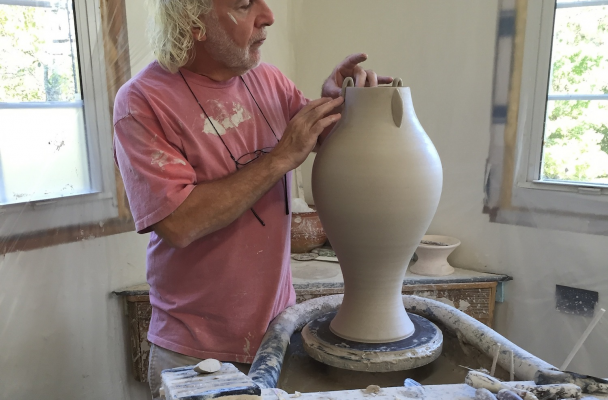Q&A on Ceramist Fred Johnston

By Liz Reichart// A&E Editor
Fred Johnston is an internationally-respected ceramicist who creates stunning and often surprising pieces by questioning the long held traditions of pottery.
He grew up in the rural South, which ignited his interest in the Southern folk pottery traditions of North Carolina. This cultural tradition is rooted in North Carolina’s colorful history and characters, but his work is not limited to these influences alone. Greek, Korean, Chinese, Pre-Columbian, European and Mimbres styles can all be seen in his pottery work of urns and vases.
Johnston will be visiting High Point University on April 6, from 7-8 p.m. in the ballroom of the Plato S. Wilson School of Commerce. Mark Brown, instructor of art and ceramics at HPU, weighs in on the importance of Johnston’s legacy in ceramics.
Question: Johnston is a globally-renowned ceramicist. Tell us how you react to his work.
Answer: Johnston’s work is functional and his designs are decidedly whimsical. He says that he is “not interested in pots that are mindless, shallow imitations and replications of the past. I believe in the idea of cross-fertilization and playfulness. The mixing and matching of different cultures, motifs, and art styles are fertile ground, a place to cultivate.” His forms, structures, and decorations bring a new contemporary aesthetic to the sometimes-staid world of ceramics.
Question: Why is it important that we hear from artists who pursue careers outside of the normal corporate workplace?
Answer: The terminology these days is to call people who work with their hands and minds “makers.” What would the world look like without makers? And what would those “corporate workplace” careers sell without makers? There will always be people who follow their passions for invention (or re-invention). These (artists or makers) are the people who create the world we live in.
Question: What is the value of ceramics today? What is the value of honing a craft today?
Answer: We have a motto in our class (from the playwright Samuel Beckett) “Ever tried? Ever failed? No matter. Try again. Fail again. Fail better!” Learning to use the wheel is not easy. Adjusting to and accepting what nature will do to your pots is not easy. Making is not easy. But, if you stick with it, continue to try, and learn from your failures as well as successes, the payoff is always worth it. This is a life lesson that transcends ceramics or art.